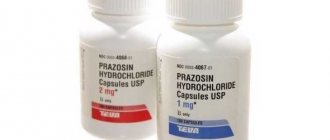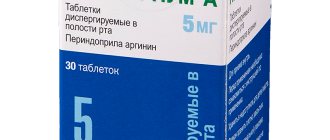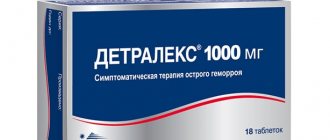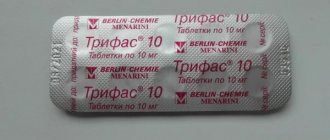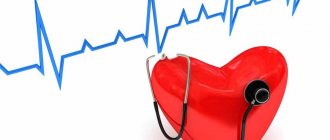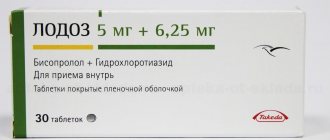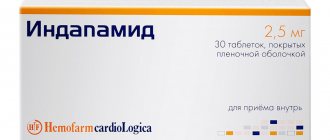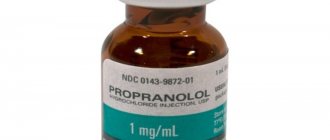Compound
The main active ingredient of Caposide is captopril: a drug from the group of angiotensin-converting enzyme inhibitors, developed in 1977 in Australia. Capozide also contains hydrochlorothiazide, which is a thiazide diuretic of medium strength - in one tablet there is no more than 25 mg, while captopril - 50 mg.
As for the auxiliary components, the drug Capozide contains:
- cellulose,
- corn starch,
- milk sugar,
- stearic acid,
- Magnesium stearate.
Interaction
The combination of the drug with Cimetidine increases its concentration in the patient’s blood.
When using Capozide according to indications, you need to take into account its compatibility with other medications, since many of them can change its therapeutic effect. Thus, Methenamine occasionally reduces the effect of hydrochlorothiazide, and simultaneous use with potassium-sparing diuretics and Heparin contributes to the development of hyperkalemia. There is a deterioration in the absorption of the diuretic substance when taking Capozide and Cholestyramine together. COX inhibitors, Indomethacin, reduce the hypotensive effect of hydrochlorothiazide and, conversely, increase the antihypertensive effect of the drug Diazoxide. The metabolism of captopril in the liver slows down, resulting in an increase in its content in the blood when taken simultaneously with Cimetidine.
Release form
Capozide is produced in the form of tablets, packaged in a contour cell plate with a capacity of 14 pieces; a common cardboard box contains 2 plates. The Capozide tablets themselves are oval and biconvex, the color is white or white with a cream tint (with acceptable marbling in texture). The beveled edge of the tablet is scored on one side and the word SQUIBB and the numbers 50/25 are embossed on the other. It remains to add that the medicine has a faint sulfide-like odor.
?⚕️ CAPOZIDE – complete instructions. At what pressure should I take it? (Analogues)
Many doctors believe that combination therapy is the most effective method of lowering blood pressure.
But patients, in turn, are often wary of the need to take several drugs at once instead of one.
But there are combined products that initially contain several active ingredients, the effect of which complements each other. Such a drug is “Capozide”, which has been used for blood pressure for quite a long time.
The Capozida tablet is white or cream-colored, biconvex, oval in shape. Sometimes the tablets show some marbling and may also have a sulfide-like odor. On one side there is an inscription in Latin capital letters - “SQUIBB” (manufacturer company), on the reverse there are numbers “50” and “25”, indicating the content of active ingredients in the drug.
Active components of the dosage form:
- captopril – 50 mg;
- hydrochlorothiazide – 25 mg.
Excipients:
- lactose;
- stearic acid;
- magnesium stearate;
- starch;
- microcrystalline cellulose.
The cardboard pack contains two blisters of 14 tablets each.
The drug "Capozide" is intended to reduce high blood pressure
At what pressure is the medicine taken?
“Capozide” is a drug based on captopril; by reading the instructions for use, you can find out at what pressure it is used. Let's study the effect of the active components of the drug:
- Captopril helps reduce the vascular resistance that they provide to blood flow. By reducing the peripheral resistance of blood vessels, it also reduces the pressure in the aorta, the main artery of the human body. Thus, there is a decrease in blood pressure in the pulmonary circulation and the right atrium.
- Hydrochlorothiazide has a pronounced diuretic effect. It removes bicarbonate, magnesium and potassium in the urine, while reducing the excretion of calcium ions. Due to this, the formation of calculi (stones) in the kidneys is stopped. Due to its diuretic effect, the substance has a slight hypotensive effect.
From this we can conclude that “Capozide” is an antihypertensive drug and is used to treat high blood pressure.
Indications
The drug is used to treat hypertension in patients prescribed combination treatment.
It is advisable to use "Capozide" for high blood pressure, since the pharmacological action of the medication is aimed at reducing blood pressure to its normal values
"Capozide" is indicated for use both in primary hypertension and high blood pressure, which is a consequence of another pathology of the body.
Instructions
The drug is taken orally, 1 tablet per day 60 minutes before meals.
Most often, the occurrence of side effects is associated with a violation of the dosage or non-compliance with the instructions for use and the recommendations of the doctor who prescribed the treatment.
The most common symptoms caused by Capozide are:
- dizziness;
- headache;
- hyperemia of the skin of the face;
- fever;
- increased heart rate;
- temporary visual impairment;
- weakness;
- drowsiness;
- thirst;
- apathy.
If Capozide is used incorrectly or for other reasons, various negative effects may occur.
Mostly these symptoms are the result of a pathological decrease in pressure caused by improper use of the drug or an individual reaction of the body.
Sometimes the side effects are more serious and can lead to serious consequences:
- swelling;
- rhinitis;
- sinusitis;
- laryngitis;
- bronchospasm;
- cerebral circulatory disorders;
- heart attack;
- stroke;
- acute renal failure;
- allergic reaction.
Contraindications
"Capozide" is not used for severe hypotension. In addition, there are a number of conditions that are a contraindication to the use of the drug.
Hypersensitivity to the components of the drug
Absolute:
- stenosis of the mitral valve, aorta, renal arteries;
- Quincke's edema;
- cardiomyopathy;
- renal coma;
- hyperaldosteronism;
- lactose intolerance;
- postoperative period for kidney surgery.
The drug is not used in pediatrics and is contraindicated in women during pregnancy and lactation.
Relative contraindications for which the product can be used with caution:
- hypovolemia (reduction in circulating blood volume);
- renal, liver failure;
- gout;
- hypercalcemia;
- desensitizing treatment;
- sodium metabolism disorder;
- hyperuricemia;
- acute myopia;
- glaucoma;
- autoimmune diseases;
- period after the use of anesthesia;
- hemodialysis treatment.
Due to anatomical and physiological characteristics, “Capozide” should be used with caution to treat patients of the Negroid race and patients over 65 years of age.
The simultaneous use of Capozide with:
- lithium and potassium preparations;
- agents that have a depressing effect on the body’s immune system (for example, glucocorticoids).
Source: https://mensup.ru/zdorove/davlenie/kapozid-instrukciya-po-primeneniyu-pri-kakom-davlenii
Therapeutic effect
Being an ACE inhibitor, Capozide reduces the amount of conversion of angiotensin II to angiotensin I, which leads to a decrease in the rate of aldosterone production. As a result, the following effects are observed:
- decrease in total peripheral vascular resistance;
- decreased blood pressure;
- reduction of post- and preload on the heart;
- dilatation of arteries to a greater extent than venous vessels;
- decreased degradation of bradykinin;
- increased Pg synthesis;
- increased coronary and renal blood flow;
- reduction of myocardial hypertrophy.
Capozide improves blood supply to the myocardium that has experienced ischemia, reduces platelet aggregation and helps reduce sodium concentration. In patients with diabetic nephroangiopathy, there is a slowdown in the rate of development of chronic renal failure.
Unlike various vasodilators, captopril does not cause reflex tachycardia, due to which the myocardium needs less oxygen. It should be added that the maximum reduction in blood pressure is achieved an hour and a half after taking the medicine, while the duration of the entire hypotensive effect depends on the dosage and frequency of administration - on average, optimal values are observed after several weeks.
The pharmacodynamics of hydrochlorothiazide should be separately considered: the substance reduces sodium reabsorption and increases the excretion of potassium, bicarbonates and phosphates in the urine. The diuretic effect is achieved within 1-2 hours after taking the medicine, and then continues for approximately 10-12 hours. In patients with diabetes insipidus, on the contrary, hydrochlorothiazide produces an antidiuretic effect - it reduces the volume of urine produced while its concentration increases. Otherwise, the drug, like Captopril, reduces blood pressure by reducing the volume of circulating blood and changing the reactivity of the vascular walls.
Composition of the tablet
The tablet consists of captopril and hydrochlorothiazide. It has a more dilating effect on arteries than on veins. It has a strengthening effect on blood circulation, both coronary and renal blood flow. If use is long-term:
- nutrition of the myocardium and arterial walls is normalized;
- blood supply to the myocardium improves after ischemia;
- platelet aggregation decreases.
Hydrochlorothiazide is a medium-strength diuretic that removes sodium from the body. Normalizes blood pressure.
Indications
The primary goal of the Capozide course is:
- fight against arterial hypertension, including its renovascular variety;
- elimination of chronic heart failure as part of complex therapy.
However, according to the instructions for use of Capozide, the drug will also be effective in diabetic nephropathy (against the background of type 1 diabetes mellitus), after the patient has suffered a myocardial infarction with subsequent dysfunction of the left ventricle.
Which is better: Capozide or Capoten?
We often hear the question of which drug to choose - Capozide or Capoten, which is better? It makes sense to prescribe Capozide if Capoten does not have the required effect. Capozide, according to the instructions for use, is a substance that, in addition to the antihypertensive base, contains a diuretic.
It is known that diuretic drugs have a pronounced effect of lowering blood pressure, and in combination with blood pressure-lowering drugs, they enhance the effect of the latter. Therefore, Capoten acts more gently, while Kaposide will reduce blood pressure more sharply and will not allow it to rise for a long time. Capozide makes sense to use at higher blood pressure, which is difficult to normalize with “light” drugs.
Instructions for use (methods, dosages)
Instructions for use of Capozide should be carefully studied by each patient, since this medicine requires a careful approach during therapy.
Capozide tablets are taken orally, the order and time of food intake does not matter, as does the duration of the entire course of administration (in the absence of side effects). In all cases, the dosage is selected individually, but the general principles are as follows:
- half a tablet if there are restrictions (25 mg + 12.5 mg);
- one tablet per day (50 mg + 25 mg);
- the maximum recommended dose of this medication is 2 tablets per day (100 mg + 50 mg), but such an increase is considered separately.
Use during pregnancy and lactation
There have been no targeted clinical trials of Capozide on pregnant women, so it is difficult to reliably judge the effect of the drug on the period of gestation and subsequent lactation.
However, available statistical data indicate the absence of any negative effects when using the drug to treat these categories of patients. Captopril-based drugs are prescribed in such situations only when the expected positive result is more significant than the likely side effects.
Use for children
The situation with the use of Capozide in children is the same as in the previous case - the use of the drug is undesirable if the patient is under 18 years of age (and even more so if the age is under 6 years). Since clinical trials have not been conducted on children, it will be difficult to predict the effects of such therapy, so it is better to choose other medications to avoid risks.
Use in old age
Elderly people should take Capozide with caution, as it belongs to the category of potent drugs. Special monitoring of the condition of an elderly patient is also necessary in cases where the medical history contains the following indications:
- renal failure;
- severe arterial hypertension;
- water-electrolyte imbalance;
- severe heart failure;
- taking allopurinol, procainamide and drugs that suppress the immune system.
CAPOZIDE
special instructions
At the beginning of treatment, an excessive decrease in blood pressure may be observed, especially in patients with chronic heart failure, severe arterial hypertension (including renal origin) and/or renal failure.
Before starting treatment, it is necessary to compensate for the deficiency of sodium ions and normalize the volume of circulating blood (reduce the dose of previously prescribed diuretics or, in some cases, completely cancel them), as well as determine indicators of kidney function. Regular monitoring of the content of potassium and calcium ions in the blood plasma is necessary (especially in patients receiving treatment with cardiac glycosides, glucocorticosteroids, often using laxatives, as well as in elderly patients), glucose, uric acid, lipids (cholesterol and triglycerides), urea and creatinine, activity of liver enzymes.
Particularly regular monitoring of blood pressure levels and laboratory parameters is necessary in the following cases: in patients with renal failure; patients with severe arterial hypertension (including renal origin); in elderly patients (over 65 years old); in patients with water-electrolyte imbalance and decompensated chronic renal failure; as well as those receiving simultaneously allopurinol, lithium preparations, procainamide and drugs that reduce immunity.
When taking LPF inhibitors, a characteristic non-productive cough is observed, which ceases after discontinuation of therapy with LPF inhibitors.
Some patients with kidney disease, especially those with severe renal artery stenosis, experience increases in serum urea nitrogen and creatinine concentrations after lowering blood pressure. This phenomenon is usually reversible, and a decrease in serum urea nitrogen and creatinine concentrations is observed if the drug is discontinued. It may be necessary to reduce the dose of Capozide® and/or discontinue the diuretic. In some cases, during the use of LPF inhibitors, an increase in potassium levels in the blood serum is observed. The risk of developing hyperkalemia when using LPF inhibitors is increased in patients with renal failure and diabetes mellitus, as well as those taking potassium-sparing diuretics, potassium supplements, or other drugs that cause an increase in potassium levels in the blood (for example, heparin). The simultaneous use of potassium-sparing diuretics and potassium supplements should be avoided.
In addition, when using ACE inhibitors simultaneously with thiazide diuretics, the risk of hypokalemia cannot be excluded, therefore, in such cases, regular monitoring of potassium levels in the blood during therapy should be carried out.
Caution should be exercised when taking ACE inhibitors in patients with mitral/aortic stenosis/hypertrophic obstructive cardiomyopathy; in case of cardiogenic shock and hemodynamically significant obstruction, use is not recommended.
The use of dual blockade of the renin-angiotensin-aldosterone system (RAAS) caused by the concomitant use of ACE inhibitors and angiotensin II receptor antagonists or aliskiren and aliskiren-containing drugs is not recommended, since it has been associated with an increased incidence of side effects such as arterial hypotension. hyperkalemia, decreased renal function (including acute renal failure). If the simultaneous use of ACE inhibitors and ARAII (double blockade of the RAAS) is necessary, then treatment should be carried out under the supervision of a physician and with constant monitoring of renal function, the level of electrolytes in the blood, and blood pressure.
The combined use of ACE inhibitors and angiotensin II receptor antagonists in patients with diabetic nephropathy is not recommended. When performing hemodialysis in patients receiving ACE inhibitors, the use of high-permeability dialysis membranes (for example, AN69) should be avoided, as in such cases the risk of developing anaphylactoid reactions increases. Anaphylactoid reactions have also been reported in patients undergoing low-density lipoprotein removal (apheresis) by absorption with dextran sulfate. The use of either a different class of antihypertensive drugs or a different type of dialysis membrane should be considered.
If angioedema develops, the drug is discontinued and careful medical observation is carried out until the symptoms disappear completely. Angioedema of the larynx can be fatal. If the swelling is localized on the face, special treatment is usually not required (antihistamines can be used to reduce the severity of symptoms); if the swelling spreads to the tongue, pharynx or larynx and there is a threat of developing airway obstruction, epinephrine (adrenaline) should be immediately administered subcutaneously (0.3-0.5 ml in a dilution of 1:1000). In rare cases, patients after taking LPF inhibitors experienced angioedema of the intestine, which was accompanied by abdominal pain (with or without nausea and vomiting), sometimes with normal values of C-1-esterase activity and without previous facial edema. Intestinal edema should be included in the differential diagnosis of patients with complaints of abdominal pain while taking ACE inhibitors.
In representatives of the Negroid race, cases of the development of angioedema were noted with greater frequency compared to representatives of the Caucasian race.
In two patients undergoing desensitization with hymenoptera venom, life-threatening anaphylactoid reactions were noted while taking captopril. When the LPF inhibitor was temporarily discontinued in the same patients, anaphylactoid reactions were avoided. Caution should be exercised when performing desensitization in patients taking ACE inhibitors.
In patients with diabetes mellitus receiving hypoglycemic agents (oral hypoglycemic agents or insulin), glycemic levels should be carefully monitored, especially during the first month of therapy with ACE inhibitors.
ACE inhibitors are less effective in blacks than in Caucasians, which may be due to the higher prevalence of low renin activity in blacks.
During major surgery or when using general anesthesia agents that have a hypotensive effect, patients taking ACE inhibitors may experience an excessive decrease in blood pressure. In these cases, the volume of circulating blood can be increased.
In rare cases, when taking ACE inhibitors, a syndrome is observed that begins with the appearance of cholestatic jaundice, turning into fulminant hepatonecrosis, sometimes with death. The mechanism of development of this syndrome is unknown. If a patient receiving therapy with ACE inhibitors develops jaundice or there is a marked increase in the activity of liver enzymes, treatment with ACE inhibitors should be discontinued and the patient should be monitored.
Neutropenia/agranulocytosis, thrombocytopenia and anemia have been reported in patients taking ACE inhibitors. Neutropenia is rare in patients with normal renal function and no other abnormalities.
The drug Capozide® should be used very carefully in patients with autoimmune connective tissue diseases, in those taking immunosuppressants, allopurinol and procainamide, especially in the presence of pre-existing renal dysfunction. Due to the fact that most fatal cases of neutropenia due to ACE inhibitors developed in such patients, their blood leukocyte count should be monitored before starting treatment, in the first 3 months. - every 2 weeks, then - every 2 months.
In all patients, the number of leukocytes in the blood should be monitored monthly in the first 3 months after starting therapy, then every 2 months. If the number of leukocytes is below 4000/μl, a repeat general blood test is indicated; below 1000/μl, the drug is stopped while monitoring the patient continues. Typically, restoration of the number of neutrophils occurs within 2 weeks after discontinuation of captopril. In 13% of cases of neutropenia, death was noted. In almost all cases, death was observed in patients with connective tissue diseases, renal or heart failure, while taking immunosuppressants, or a combination of both of these factors.
When using LPF inhibitors, proteinuria may occur, mainly in patients with impaired renal function, as well as when using high doses of drugs. In most cases, proteinuria while taking captopril disappeared or its severity decreased within 6 months, regardless of whether the drug was stopped or not. Renal function tests (blood urea nitrogen and creatinine concentrations) in patients with proteinuria were almost always within normal limits. In patients with kidney disease, the protein content in the urine should be determined before starting treatment and periodically during the course of therapy. Rare cases of agranulocytosis and bone marrow suppression have been reported when taking thiazide diuretics. Sulfonamide derivatives (including hydrochlorothiazide) can cause transient myopia and acute angle-closure glaucoma, risk factors include a history of allergy to sulfonylureas or penicillin. Symptoms (sharp decrease in visual acuity, pain in the eyeball) are usually observed within a few hours to several weeks after the start of treatment. If symptoms appear, you should immediately stop taking the drug; If necessary, medications to correct intraocular pressure should be prescribed.
In all patients taking thiazide diuretics, clinical signs of fluid and electrolyte imbalance (hyponatremia, hypochloremic alkalosis, hypokalemia) should be identified. It is especially important to determine the content of electrolytes in serum and urine during severe vomiting or during the administration of infusion solutions. Signs of water-electrolyte imbalance may include dryness of the oral mucosa, thirst, weakness, lethargy, confusion, anxiety, muscle pain or cramps, muscle weakness, excessive decrease in blood pressure, oliguria, tachycardia, nausea, vomiting. Hypokalemia can provoke or enhance the cardiotoxic effect of cardiac glucosides. The deficiency of chloride ions is usually mild and does not require correction. Patients with edema in hot weather may experience hyponatremia caused by an increase in circulating blood volume. Liquid intake should be limited. In cases of life-threatening hyponatremia, table salt is prescribed. During therapy with thiazide diuretics, hyperuricemia or exacerbation of gout may occur; Latent diabetes mellitus may also manifest itself.
Thiazide diuretics can cause a decrease in the concentration of bound iodine in the blood serum without signs of thyroid dysfunction. When taking thiazide drugs, the degree of calcium excretion decreases; There have been cases of pathological changes in the parathyroid glands, accompanied by hypercalcemia and hypophosphatemia. Before monitoring parathyroid function, the thiazide diuretic should be discontinued. While taking thiazide drugs, there was an increase in the degree of magnesium excretion, which can lead to hypomagnesemia.
The drug Capozide® may cause a false-positive reaction when testing urine for acetone and distort the results of the test with bentiromide.
If fever, swollen lymph nodes and/or signs of laryngitis and/or pharyngitis occur, the white blood cell count should be immediately determined. Taking thiazide diuretics may cause a positive result during doping control.
Contraindications
Contraindications for Caposide, in addition to pregnancy, lactation and childhood, include hypersensitivity to both captopril and thiazide diuretics.
- You will have to stop taking the drug if the patient has pathologies of the cardiovascular system: stenosis of the aorta, mitral valve and renal arteries, obstructive cardiomyopathy and heart failure.
- Conditions such as tachycardia, liver failure, hypotension and cardiac shock are also strict contraindications to the use of the drug.
- With great caution, Capozide should be prescribed to patients with a deficiency of potassium, sodium and calcium, with a parallel course of immunosuppressants.
Contraindications of the drug
It is strictly forbidden to take Capozide with high blood pressure in patients with the following clinical contraindications:
- Pathologies of the renal apparatus that occur in severe form;
- Arterial hypotension (low blood pressure);
- Obstructive cardiomyopathy of a hypertrophic nature;
- Individual intolerance and excessive sensitivity to the components contained in the drug;
- Hepatic coma;
- Mitral stenosis;
- The presence in the patient's medical history of angioedema caused by taking ACE inhibitors;
- Shock state of cardiogenic nature;
- Rapid heartbeat (tachycardia);
- Previous surgery for a kidney transplant;
- Hyperaldosteronism;
- Chronic heart failure;
- Bilateral renal artery stenosis;
- Aortic stenosis.
Tablets are prohibited from being used to treat women expecting the birth of a baby, mothers during breastfeeding, and children and adolescents who have not reached the age of majority.
Chronic heart failure is a contraindication for taking the drug
With particular caution, Capozide for high blood pressure is prescribed to persons over the age of 65 years, to patients suffering from:
- hypercalcemia;
- periarteritis;
- hypokalemia;
- scleroderma;
- gout;
- proteinuria;
- hyponatremia;
- diseases of the renal apparatus;
- systemic pathologies of connective tissue structures;
- diabetes mellitus;
- autoimmune diseases,
Treatment of this category of patients requires individual selection of a safe dose and strict supervision by specialists.
It is not recommended to use Capozide during therapy with cytostatics, immunosuppressants, Procainamide, lithium preparations, Allopurinol.
Side effects
The list of side effects of Capozide includes many negative conditions, most of which occur in a maximum of 10% of patients. However, you need to be prepared for the risk of the following deviations:
- from SSD: tachycardia, arrhythmia, angina pectoris, pallor, flushing of the face;
- from the respiratory system: dry cough, shortness of breath, rhinitis;
- allergic reactions: skin itching, rashes, swelling of facial tissues, urticaria, photosensitivity;
- from the nervous system: drowsiness, dizziness, headache, blurred vision;
- from the gastrointestinal tract: nausea, vomiting, pain, diarrhea, constipation;
- from the genitourinary system: renal dysfunction, polyuria.
Side effects
If Capozide is used incorrectly or for other reasons, various negative effects may occur, which are described in detail in the table:
| Occurrence area | Manifestations |
| urinary system | Frequent urination |
| Presence of glucose in urine | |
| A sharp slowdown or increase in urine production | |
| Kidney inflammation | |
| Metabolism | Increased amount of uric acid, sugar, lipids, magnesium in the blood |
| Increased content of potassium ions in the blood fluid | |
| Hematopoietic system | Decrease in neutrophils, leukocytes, platelets |
| Anemia | |
| Increase in special eosinophil cells | |
| CNS and CVS | Tremor |
| Noise in ears | |
| Feeling hot | |
| Ataxia | |
| Convulsive conditions | |
| Depression | |
| Sleep disturbance | |
| Depression | |
| Headache | |
| Weakness | |
| Digestive system | Inflammation of the pancreas |
| Decreased appetite | |
| Frequent loose stools or constipation | |
| Gagging | |
| Acute inflammatory process in the gallbladder | |
| Abdominal pain | |
| Nausea | |
| Respiratory system | Laryngitis |
| The process of inflammation of the nasal mucosa | |
| Infectious and inflammatory lesions of the paranasal sinuses | |
| Dry cough | |
| Bronchospastic syndrome | |
| Other | Sexual impotence |
| Progression of myopia |
Overdose
The first sign of overdose is acute arterial hypotension. If the situation worsens and there is no timely assistance, the patient’s serious condition may increase:
- myocardial infarction;
- circulatory disorders in the brain;
- thromboembolism;
- angioedema.
Note: hypotension is more often observed after the first dose of Capozide. Before starting treatment, it is recommended to correct the electrolyte balance, replenish the blood volume, and discontinue some of the previously used diuretics.
Patient reviews
Users' opinions about the drug are necessary both for patients to know what to expect from this drug, and for manufacturers and distributors to understand what still needs to be worked on. Capozide is no exception to this.
Reviews from patients are varied, but mostly they talk about positive results from taking the drug.
So Alexandra shared that her mother took Capozide tablets for a long time. I liked the result. There were no side effects while taking the drug. The only undesirable manifestation was at the beginning of treatment: the pressure dropped sharply. But this was the only time, subsequent appointments went well.
Irina noticed that the pills helped her a lot. They brought her blood pressure to a stable state, and she also noted a significant improvement in her health. From time to time there was slight nausea, which quickly passed.
But opinions vary, there are also negative ones. For example, one doctor said that Capozide is outdated and does not have a sufficiently long-lasting effect on the patient’s body.
The patient, who has been taking the drug for four months, also agrees with him, but has not received the expected normalization of blood pressure, which is indicated in the instructions for use. In addition, she developed a dry cough, dizziness, and nausea.
Some patients taking Capozide give reviews with complaints about the side effects of the drug indicated in the instructions for use. Some patients experienced edema, tachycardia, blood pressure dropped too sharply (especially in the morning), and a dry cough. One fifty-five-year-old man complains of skin rashes that appear and disappear.
We can conclude that Capozide, like many other antihypertensive drugs, should be tried to be included in the treatment regimen. If it works effectively, the dosage should be adjusted based on the patient's condition.
Drug interactions
- Indomethacin and other non-steroidal anti-inflammatory drugs weaken the hypotensive effect of Capozide, while thiazide diuretics and vasodilators, on the contrary, enhance it.
- When potassium-based drugs and supplements are added to therapy, there is a risk of hyperkalemia, and the elimination of lithium drugs is slowed down.
- Combination with procainamide and allopurinol increases the risk of developing Stevens-Johnson syndrome, and with immunosuppressants - the risk of hematological abnormalities.
Compatibility
“Capozide” enhances the effect of sleeping pills when taken simultaneously.
When taking Capozide tablets for high blood pressure, it is important to know that they increase the plasma content of Digoxin, the neurotoxicity of salicylates, and the therapeutic effect of ethanol. When combined with Procainamide, the risk of developing immunosuppressive effects increases significantly; the same effect is observed when combined with medications that reduce the number of granulocytes and leukocytes. It is worth considering that “Capozide” enhances the negative effect of cardiac glycosides on the human body, especially if taken together with medications that increase the excretion of magnesium and potassium. There is an increase in the hypotensive effect when the pharmaceutical drug "Capozide" is combined with thiazide diuretics, the drug "Verapamil", as well as other antihypertensive drugs, sleeping pills, ethanol and tricyclic antidepressants.
special instructions
At the beginning of therapy with Capozide, the patient may experience an excessive decrease in blood pressure, especially in a patient with severe heart failure.
The content of hydrochlorothiazide in the drug should be taken into account, so if the patient is taking any diuretics, their dosage should be reduced.
Before starting treatment, it is imperative to evaluate kidney function, and subsequently monitor the levels of potassium, glucose, lipids, uric acid and calcium in the blood.
Finally, during the entire course of taking Capozide, experts recommend refraining from engaging in potentially dangerous activities that require quick reaction and constant concentration - such as when driving a car or operating complex mechanisms.
Interaction with other drugs
When taking drugs from the same groups - antihypertensives, vasodilators or diuretics - the hypotonic, vasodilator or diuretic effect is enhanced. Significant potentiation of the diuretic effect is common with simultaneous administration of thiazide and loop diuretics.
In practice, hydrochlorothiazide and furosemide mutually potentiate each other. Treatment of hypokalemia is important when using diuretics and other drugs. At the beginning of therapy, the risk of hypercalcemia is significantly higher when using aliskiren.
Important! Hypokalemia may increase the toxicity of digoxin and some antiarrhythmic drugs.
Analogs
The active ingredient of Caposide is captopril, and today in Russia many types of medicine are produced under this name, but from different manufacturers. Similar substitutes can also be found from foreign pharmaceutical companies from the Czech Republic, Hungary or Bulgaria, but they will also cost more: from 100 rubles per package versus 50-60 rubles for Russian analogues of Capozide.
It is worth considering that other factors also influence the final price of the drug - for example, drugs with a lower concentration of captopril in one tablet will cost less.
There are no direct analogues of Capozide in Russia, since this product additionally contains hydrochlorothiazide, which in all other cases will have to be purchased separately.
Directions for use and dosage
The drug is used as one part of symptomatic therapy, the dose is selected individually, depending on the clinical picture of the disease. Typically, the initial dose of Capozide according to the instructions is half a tablet once a day, an hour before meals. During further treatment, the dose can be either increased to two tablets per day (according to necessary indications) or reduced to the minimum at which there is still an effect from taking Capozide. If there are no side effects, the drug can be taken indefinitely.
Drug compatibility
The combination of Capozide with thiazide diuretics, beta-blockers, antidepressants, and sleeping pills enhances the hypotensive effect and threatens the development of a hypotensive crisis.
The combination of tablets with Methenamine, Cholestyramine, COX inhibitors, Indomethacin, on the contrary, significantly reduces the antihypertensive effect of Capozide.
Use together with Cimetidine helps to increase the concentration of the active components of Capozide in the blood, which must be taken into account when selecting the optimal dosage of the drug.
Simultaneous use of the drug with diuretics and diuretics, cardiac glucosides, increases the manifestation of undesirable reactions characteristic of these medications.
Capozide significantly enhances the effect of anesthetic drugs, which is important to consider when planning surgery.
You should check with your doctor about the compatibility of Capozide with other drugs.
Drug overdose
The most common manifestation of overdose is hypotension, often symptomatic. To prevent an overdose, you need to reduce the dose of the medicine or stop treatment. In rare cases, additional fluid may be necessary. Hypokalemia and hyponatremia are eliminated by the introduction of ionic solutions.

